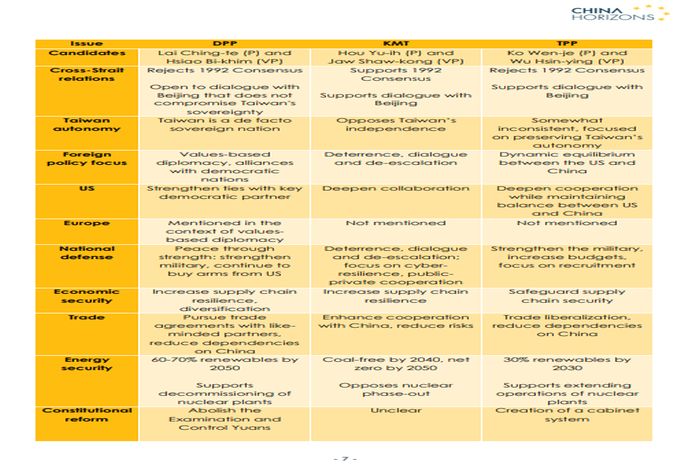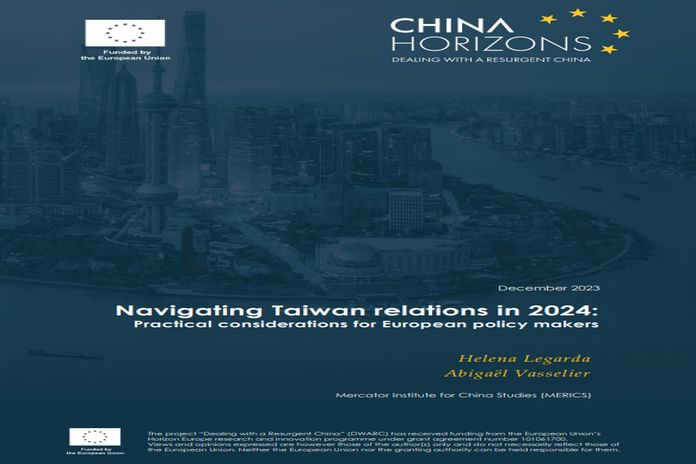By Helena Legarda and Abigaël Vasselier, Mercator Institute for China Studies (MERICS)
Abstract
CHINA / TAIWAN / EU – On 13 January 2024, the Taiwanese people will vote for their next President, and with that the future of their relations with Beijing. China’s approach to relations with Taiwan has changed under President Xi Jinping, and this has led all of Taiwan’s political parties to reshape their policy platforms including related to the question of dialogue with Beijing, but also to their trade and economic strategies, as well as defense and foreign policy priorities.
This policy brief explores how, in the context of increased geopolitical tensions between the US and China, different results of Taiwan’s presidential elections might shape cross-strait relations and regional dynamics. It analyzes how these results will affect Europe’s current approach to Taiwan and tensions in cross-Strait relations and identifies priorities to prepare for challenges ahead.
Key findings
- Taiwan is preparing for its January 13 presidential elections and a government transition at a critical geopolitical moment: US-China competition has become the new normal, war is raging in Ukraine and Gaza, the US faces a divisive presidential election in November 2024 and China is mired in an economic slowdown and societal tensions.
- The situation in the Taiwan Strait is increasingly volatile. Since President Xi Jinping came to power, Beijing has adopted a more aggressive posture towards Taiwan, stepping up military activities in the region and pressure on Taiwan’s international allies. Meanwhile, support for ‘reunification’ continues to fade in Taiwan, narrowing Beijing’s options to achieve its strategic objective to more coercive ones.
- The results of the presidential elections are unlikely to fundamentally shift the current trajectories in cross-strait and regional tensions in the long run. Other factors, especially US-China relations and the domestic situation in China are much more likely to structurally change regional dynamics.
- In the short to medium term, the impact of the elections will be felt in the Taiwan Strait and across the region, as all actors adjust to the new administration’s tone and policy priorities. A DPP win, which Beijing sees as the worst outcome, would create a scenario of continuation and of further accumulation of tensions. A KMT victory, on the other hand, would likely diffuse tensions in the short run, as both sides of the Strait attempt to reestablish dialogue.
- Europe has only belatedly begun to wake up to how deeply its interests are linked to the status quo in the Taiwan Strait. US-China technology competition, China’s aggression in the Strait and its coercion against Lithuania for allowing the opening of a Taiwan Representative Office in Vilnius have sounded the alarm. But Europe has yet to give sufficient attention to the intricacies of this vibrant democracy or the impact of its domestic politics on cross-Strait relations and regional dynamics.
- To ensure an appropriate response to all post-election scenarios, and to future-proof its interests in the region and its relations with Taiwan, the EU needs to act on six priorities, including increasing knowledge, improving preparedness and resilience, working towards deterrence, building a solid bilateral agenda with Taiwan, and seeking partners.

Over the past years, the EU has started to discuss Taiwan with like-minded partners as part of regular bilateral discussions on China. This has been institutionalized through formats such as the EU-US Dialogue on China or the G7 track on China. NATO has also become a platform to discuss challenges in the region. Facing a potential and largely foreseeable crisis at some point in the future, the EU should also turn Taiwan into a standard discussion topic with Indo-Pacific countries, regardless of their like-mindedness and regardless of the results of the 2024 elections.
Sharing analyses on the situation in the Taiwan Strait as a regional hotspot, separately from discussions on China with partners, is essential for Europe to develop scenarios and to better understand the interests and possible reactions of other actors. This should also allow for better communication and coordination in case of crisis. Tensions in the East and South China Seas have already shown that talking to countries from the whole region is valuable to diffuse friction from multiple directions.
The full document is available – 231219_Taiwan Policy Brief_FINAL
As of 18 December 2023, 17 Member States are represented in Taipei. This year, the European Economic and Trade Office, which represents the EU in Taiwan, celebrates its 20th anniversary.
The project “Dealing with a Resurgent China” (DWARC) has received funding from the European Union’s Horizon Europe research and innovation programme under grant agreement number 101061700.
[Views and opinions expressed are however those of the author(s) only and do not necessarily reflect those of the European Union. Neither the European Union nor the granting authority can be held responsible for them.]






